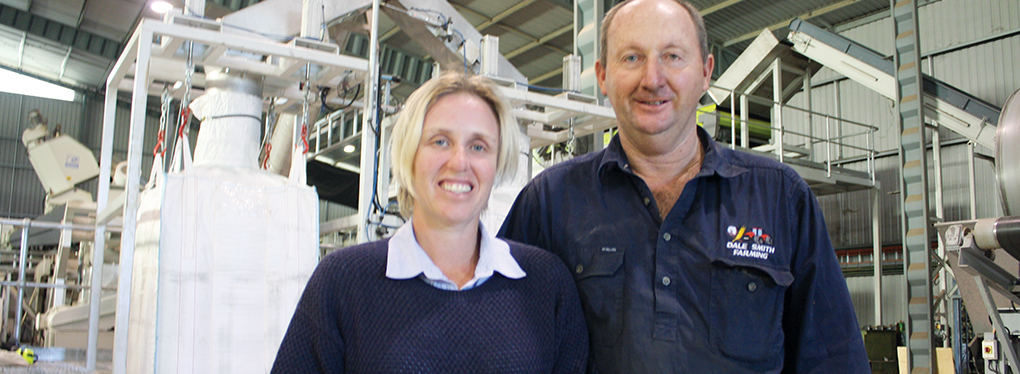How Dale Smith worked with equipment specialists Telford Smith Engineering to set up Australian Recycled Plastics, a specialist recycling and washing facility producing food grade PET.
It was a reverse logistics conundrum and curiosity that first led the owner of a family-run Australian haulage business to investigating the potential for plastics processing plant.
In 2013, Dale Smith, founder of Australian Recycled Plastics (ARP), contacted local machinery manufacturer Telford Smith Engineering about supplying a recycling line for mixed plastic bottles for his premises in north-west New South Wales.
Dale had bought the site in Narrabri three years ago when he and his wife, Helen, started thinking about a recycling plant. They also own a haulage firm, which transports about 30 per cent of Australia’s cotton.
“We looked into the recycling business partly because 90 per cent of our trucks were delivering cotton to the capital cities and ports, and were coming back empty as there was no product to bring back,” explains Dale.
As the firm also transported waste material for other companies, Dale started to question what happened to that product and developed an interest in the recycling process.
“I learnt most waste plastics sent to materials recovery facilities are exported out of Australia, with a general mix of 40 per cent PET, 40 per cent HDPE and the other 20 per cent other plastics.”
With refreshing frankness, Dale says at the start he and Helen didn’t know exactly what they wanted to achieve, but they saw the potential “to do something” with processing recovered plastics.
Even before investing in the plant or deciding what it would process, Dale started to buy the 4/4/2 material.
“I wanted to make sure there were avenues there to get enough supply to run a plant,” he says.
A chance encounter for equipment
At this stage, with neither previous recycling experience nor contacts, Dale started the search for a knowledgeable supplier. A chance encounter led to him working with Telford Smith Engineering (TSE).
“A friend, who was helping me find equipment, noticed a factory processing PVC pipe while working in Melbourne,” Dale says. “He asked them about their equipment, which they said they had bought from Telford Smith.”
It was a stroke of luck for Dale and Helen, as what they lacked in knowledge and technical ability, TSE made up for it. The firm has been running since 1927, has extensive experience in this field, and owns a manufacturing plant in China.
Dale contacted TSE’s Managing Director, Steve Picone, about his plans.
“The requirement was for the supply, installation and commissioning of a complete plant for sorting size, size reduction and washing of mixed plastic bottles,” Steve recalls.
The feedstock was going to be 350-kilogram bales of bottles made up of a 4/4/2 mix of PET/HDPE and mixed plastics.
Steve says that despite being a complex process, it is common for pre-sorted PET bottles to be collected and processed through size reduction and wash plants to achieve bottle-to- industrial grade washing. That fitted Dale’s initial aim to wash PET and HDPE bottles to a standard that allowed sale for industrial applications.
“That objective changed, however, when he saw an opportunity to sell washed flaked PET into more lucrative food applications, requiring the next level of technology,” adds Steve.
The broker Dale used to buy the waste plastics had introduced him to a potential client for recycled PET– a UK-based company planning to open a factory in Melbourne to make plastic trays for packaging meat that keep the product fresher for longer.
“Once we secured a customer to buy the recycled product, a food grade PET, that determined the type of equipment we needed,” he says.
An overseas hunt for equipment
The pair then carried out extensive research for machinery that would deliver on the client’s requirements.
“Steve said if we were serious about the project then we should visit some plants China,” says Dale.
A firm partnership was formed as Steve organised for Dale, Helen and their six- week-old son to fly to China, and then drove them around investigating what technology was on the market.
The equipment hunt tour began, as Dale and Steve undertook several research trips to recycling plants in China, German and Thailand, and even one in Melbourne. This first-hand experience formed the basis for the decision making process.
“Steve and his team are very knowledgeable,” Dale states. “If they didn’t know the answer to an equipment query, they’d find out for us and then take us to see it in action.”
It took around nine months to finalise what Dale needed, and he eventually placed the order in September 2013.
“As the investment was considerable, I advised Dale to buy the best equipment or have us build it for vital parts of the operation, and then we could source cheaper machines for the lower-risk elements,” Steve adds. “When you need to deliver a certain specification, there are parts of a plant where you shouldn’t take any risks.”
Equipping the plant
The ARP plant comprises an extensive range of equipment TSE designed in Australia and manufactured at its factory in Ningbo, China, including the entire control system.
TO READ MORE CLICK HERE.



